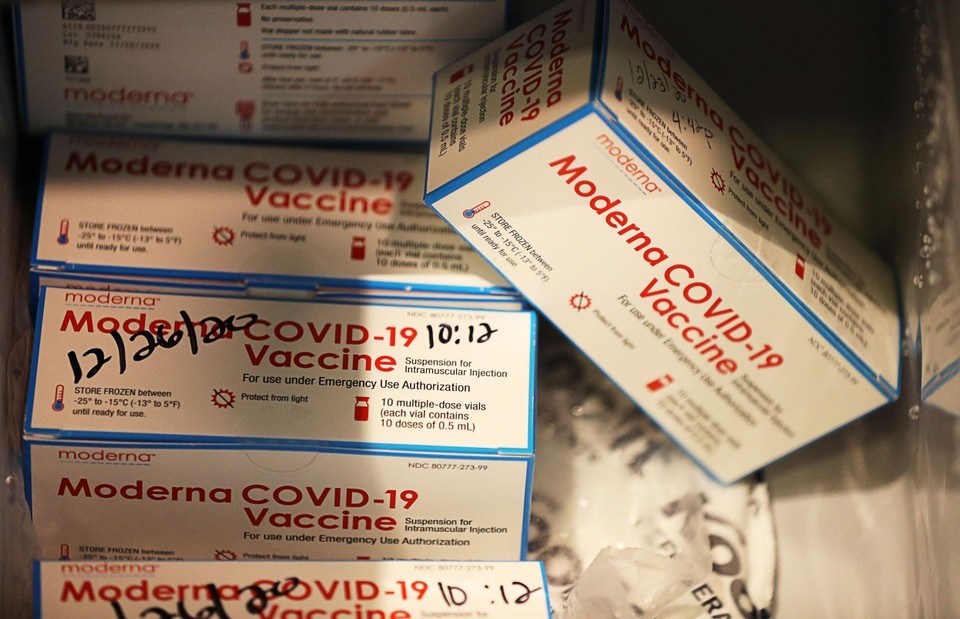The European Commission authorised the use of Moderna's Covid-19 vaccine after the European Medicines Agency (EMA) recommended it on Wednesday, but what does it mean for Belgium's vaccination plan?
After Pfizer-BioNTech's vaccine, which is currently already being administered, Moderna's one is the second one that will soon be used on the European market.
According to Dirk Dewolf of the Flemish Agency for Care and Health, a first limited delivery of the vaccine is planned for February. However, there is no exact date yet, said Flemish Welfare Minister Wouter Beke's cabinet.
How much does the vaccine cost for Belgium?
Moderna is the most expensive vaccine that Belgium ordered, as was previously shown by the price list leaked by Secretary of State Eva De Bleeker: $18 (around €15) per dose.
Pfizer's vaccine costs €12 per dose, the one developed by AstraZeneca will only cost €1.78.
What is the difference between Moderna's vaccine and Pfizer's?
The two vaccines are similar, as they use the sale mRNA technology, virologist Johan Neyts told Het Nieuwsblad.
"This is the genetic code for the spikes on the surface of the virus, allowing it to attach itself to cells of our respiratory tract," he said. "After injecting the vaccine, the body produces antibodies against these spikes."
Related News
- Brussels nursing home staff to get vaccine one week early
- EMA recommends Moderna's Covid-19 vaccine for market authorisation
- EU approves Moderna Vaccine
These antibodies then prevent the virus from entering our body. "The piece of genetic code is not simply injected, but wrapped up in tiny globules of fat," Neyts added.
However, the exact composition is the company's secret, he said. "It may explain why there is a difference in storage temperature: Pfizer's vaccine should be stored at -70 degrees, Moderna's at -20 degrees and possibly even -5 degrees."
Which groups will get which vaccine?
In Belgium, such a decision has not yet been made. However, as Moderna's vaccine is easier to store, it is more suitable to be distributed on a smaller scale, according to experts.
In the Netherlands, the Health Minister advocated reserving the Moderna vaccine for people over 60 living at home, who can get the vaccine from their GP.
The Dutch vaccination strategy reserves Pfizer's vaccine for the elderly in care institutions as much as possible, while Moderna's one may also be used in smaller institutions.
Additionally, Moderna's vaccine has been approved for use from the age of 18, while Pfizer's can be used for people from 16 years old.
Does Moderna also require a second injection, like Pfizer?
Yes, a second dose of the vaccine is necessary for maximum protection, according to both companies.
Both shots should be placed in the upper arm, with Moderna even specifying during the tests that it had to be on the same arm.
For Pfizer's vaccine, the second injection is required after three weeks. For Moderna, it concerns four weeks. "That second dose is necessary to strengthen immune memory," professor of vaccinology Isabel Leroux-Roels told De Standaard.
The European medicines agency EMA stated that a second Pfizer shot should be given 42 days after the first one, at the very latest. This is also the maximum time period used by the manufacturer in its study.
Are there advantages to the lower storage temperature?
"To store Pfizer's vaccine extremely cold, we need very special and expensive freezers, such as those in our laboratories," said Neyts.
At -20 degrees, however, more classic freezers can be used. "I think that is definitely an advantage for Moderna," he added.
Once thawed, the Moderna vaccine is still good for another 30 days at fridge temperature, whereas it is only five days in Pfizer's case.
However, this should not make much difference in practice, according to Neyts. "You do not take a vaccine out of the freezer and then just leave it for a month. As UZ Leuven does: the vaccine is stored at -70 degrees, thawed and distributed directly to residential care centres."
How many vaccines will Belgium receive per week?
From Pfizer, Belgium receives 87,000 doses a week. As far as the Moderna vaccine is concerned, Belgium does not know yet, as it will depend on the company, according to Beke's cabinet.
A lot will also depend on how Moderna is doing, logistically, according to Neyts. "To make another comparison with Pfizer: one week after approval, the first patient received his injection here."
Through the European Commission, Belgium subscribed to 2 million doses, which is the lowest number on the list of vaccines ordered by the country.
Additionally, the Moderna vaccine requires a second injection per person, as is the case with Pfizer's one, and most others. This means that the 2 million doses can only be used for 1 million people.
In the first three months of this year, the company expects to produce 100 to 125 million doses of its vaccine, most of which will be destined for the US market, where the vaccine was already approved about two weeks ago.
Later in the year, production should be stepped up, with the company aiming for 500 million to 1 billion doses for the whole of 2021.
Are the vaccines also made in Belgium, like Pfizer's?
No. While Pfizer's vaccine is produced in the company's Belgian site in the municipality of Puurs, Moderna concluded an agreement with a Swiss company to produce for the European market. The factory in Visp (canton of Wallis) can produce up to 800,000 doses a day.
Maïthé Chini
The Brussels Times

